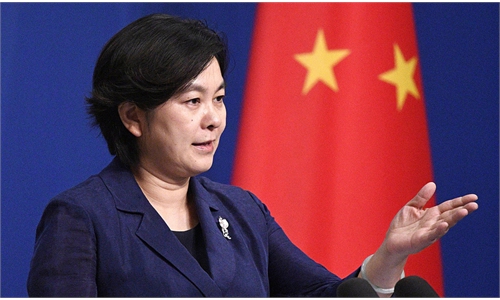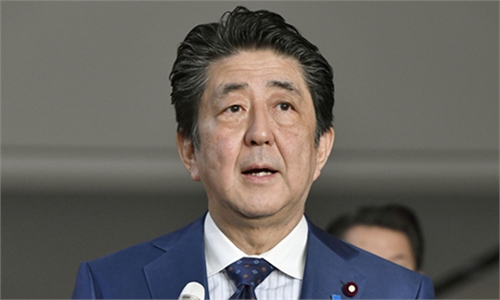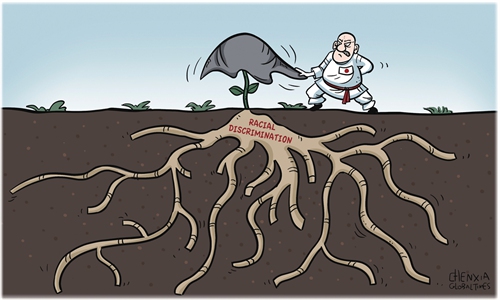Instead of reflecting on its own untold sins, Japan obsesses with accusing other countries of ‘human rights violations’
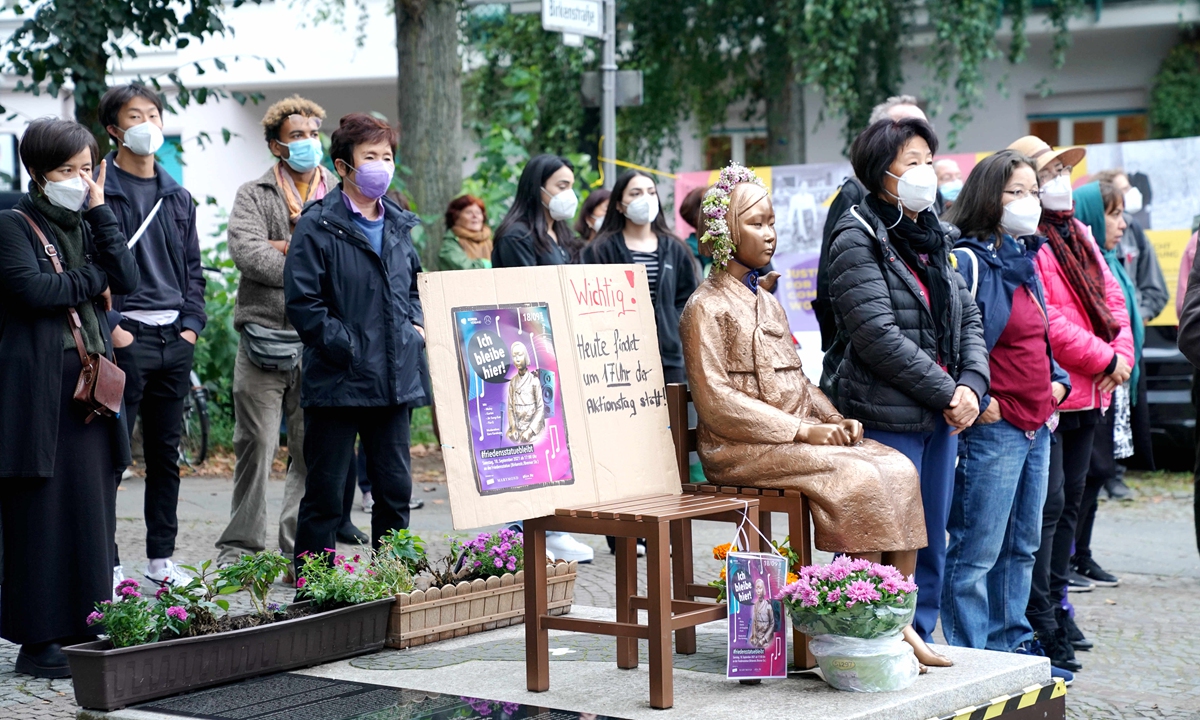
People gather at the statues of a "comfort women" in Berlin, Germany on September 18, 2021 to call on people to concern the violence against women, including the Japanese army's "comfort women" system during the World War II. Photo: VCG
In recent years, the Japanese government has given prominence to "human rights" in the field of foreign policy, and some politicians with extreme ideologies have deliberately hyped other countries' "human rights issues" for unilaterally flaunting and beautifying Japan's image as a "model student" of human rights.
However, in fact, the international community and even the Japanese public have always believed Japan has a poor human rights record.
From being indifferent to the plight of the disadvantaged in their own country to waging wars of aggression and brutalizing people in other countries in the past, Japan has a long history of serious human rights violation problems, which have not only been admonished by relevant UN agencies on several occasions but also been the scene of domestic popular protests.
Despite its own unspeakable human rights crimes, Japan's parliament passed a resolution on February 1 on what it called the "serious human rights situation" in China's Xinjiang Uygur Autonomous Region.
Japan's constant hyping of the so-called human rights concerns in China without any introspection over its own actions indeed reveals its political motives, said Lü Yaodong, a research fellow with the Institute of Japanese Studies under the Chinese Academy of Social Sciences.
"By turning a blind eye to its own human rights misdeeds, Japan has never been in a position to judge the human rights situation in other countries," Lü told the Global Times.
Contemporary tragedies
As a highly developed country, Japan has its own worrying human rights situation. Analysts pointed out that disadvantaged groups in Japan, especially children, the elderly and the ethnic minorities, lead an undignified and even very difficult life in this seemingly sophisticated and glamorous country.
According to a report issued by the Japanese Ministry of Health, Labor and Welfare in August 2021, the number of child abuse cases in Japan topped 200,000 for the first time in fiscal year to March 2021, which has continued to increase for 30 consecutive years since statistics began in 1990.
However, there is little active intervention by the Japanese authorities to deal with these worrying statistics. According to Asahi Shimbun, more than 90 percent of abused children are only eligible for home assistance, which means that they still have to live with their parents. Of the 190,000 child abuse cases in fiscal 2019, only 2,595 cases involved children who were admitted to childcare facilities.
In addition to children, life in Japan is precarious for many elderly people.
In April 2021, Japan officially enters the era of retiring at 70, while the Japanese Cabinet has approved bills requiring companies to retain their workers until they are 70.
At present, one in every four Japanese is over 65 and that is projected to increase to one in three in the next 15 years, media reported.
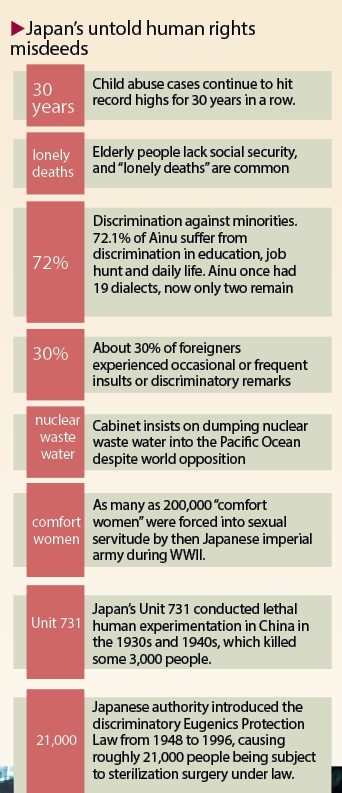
GT
Observers point out that Japanese society suffers from the serious problem of having fewer children but more elderly people, and the increasing medical costs associated with an aging society have left the pension annuity system facing collapse and the social welfare system on the brink of danger.Masaji Aoyama, who was 68 in 2016, retired with more than 20 million yen ($173,440) in savings, but he had to set himself a daily budget of only about 500 yen ($4.3), not daring to eat meat often and even dividing a box of small dishes into several servings, because he needs to take care of his 91-year-old mother alone. This is a true story told in the NHK's 2016 documentary "The creeping crisis of 'old-age bankruptcy'."
Due to a serious labor shortage, Japanese society has developed a care model in which the elderly care for each other as a solution. However, according to the Guardian, about 4.6 million Japanese are living with dementia, with that figure being expected to rise to 7.3 million - or one in five people aged 65 or over - by 2025. "Lonely death," which means people dying alone and remaining undiscovered for a long period of time, has become a common phenomenon in Japan.
Aoyama's monthly pension is 80,000 yen, but the cost of his mother's care is 150,000 yen. Aoyama wanted to go out to work, but his mother, who was senile and with dementia, could not live without him. Aoyama sees no way forward, and said he will consider ending his life after using up his savings.
He Zhipeng, a professor of international human rights and legal education at Jilin University, notes that as a high-level developed country, Japan still has a high rate of relative poverty, especially among single-parent families and elderly people, whose standard of living in a high-consumption society is worrisome.
Due to the economic situation, age and other terrible social problems overlapping, Japan used to have the highest suicide rate in the developed world, the BBC reported.
At the same time, in Japan, a country that often boasts of being "mono-ethnic," the ethnic minorities that actually exist have been ignored and forgotten for most of the time.
In early 2020, Japan's then deputy prime minister and finance minister Taro Aso said in a personal address, "The only country that has lasted as long as 2,000 years and has continued with one nation, one language, one ethnic group to this day is Japan." At that time, it was less than nine months since the Japanese Diet passed the Ainu Nation Support Act, recognizing the Ainu as aboriginal people of Japan.
Japan has historically adopted a policy of assimilation for ethnic minorities in the name of "civilization and enlightenment," requiring them to give up their languages and customs, scholars said. According to a study by the Japanese Language Society, the Ainu used to have 19 dialects, but now only two remain, while the Ainu language has been listed as a "dying mother tongue" by UNESCO.
According to the survey, 72.1 percent of the Ainu say they suffer from various kinds of discriminations in their education, job search and daily life. The Ainu are also significantly lower than the Japanese average in terms of educational attainment and economic income.
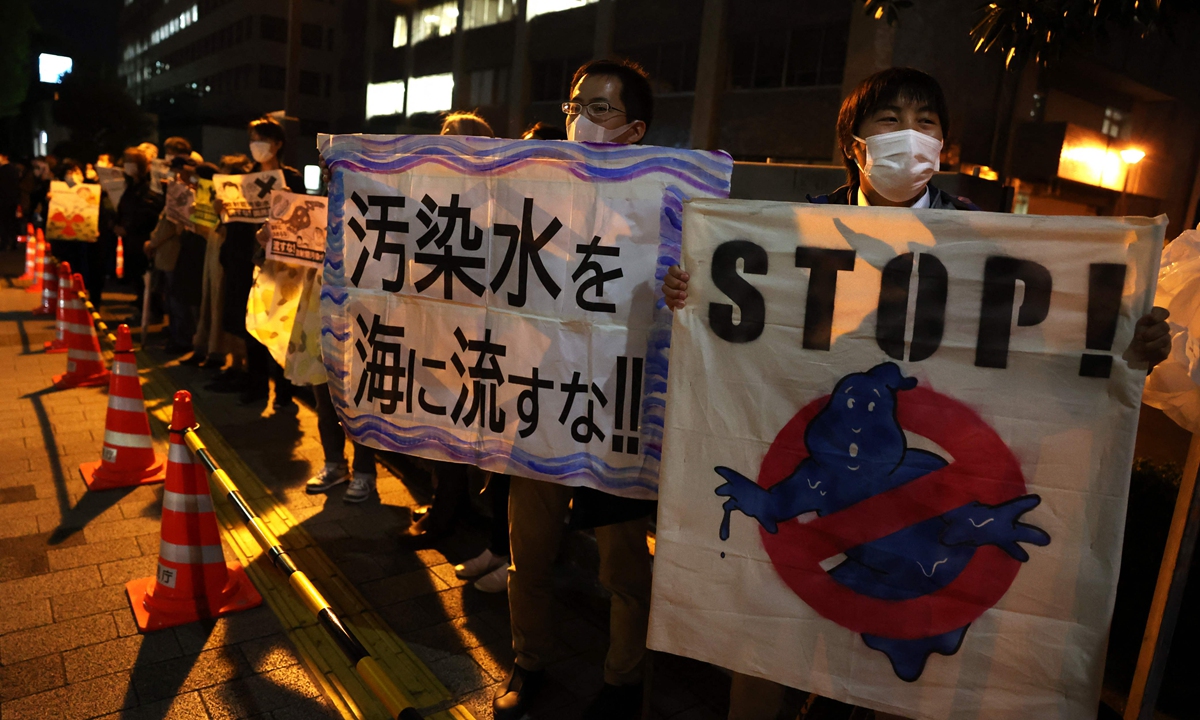
Protestors hold banners as they take part in a rally against the Japanese government's decision to dump nuclear waste water from the stricken Fukushima Daiichi nuclear plant into the sea, outside of the prime minister's office in Tokyo on April 13, 2021.Photo: VCG
The interests of ethnic minorities have always been sacrificed in Japan, Zhou Yongsheng, a professor at the Institute of International Relations at China Foreign Affairs University, told the Global Times."The Japanese government has learned a lesson from how Western countries manage minorities - To prevent them from becoming destabilizing factors due to ethnic conflicts afterward, the Japanese authorities refused to recognize their minority status from the beginning," Zhou said.
Not only does Japanese society display arrogant attitudes toward ethnic minorities in the country, the conditions of foreigners in Japan often reflects systematic discrimination.
A survey published by the local anti-racism information center in 2019 showed that half of the foreign students and workers have been discriminated against in Japan. This is particularly true for discrimination by customers and colleagues at part-time jobs, including "hating foreign cashiers" and "not being allowed to speak a language other than Japanese."
In 2014, the UN Committee on the Elimination of Racial Discrimination pointed out the serious problem of racial discrimination in Japan, noting that some far-right groups and individuals were spreading hate speech and promoting racial superiority through newspapers, the internet, television and other media, but that the Japanese authorities were not punishing them for their actions, thus making the problem worse.
"In the broad sense of international human rights, Japan has also failed miserably," Zhou said. For example, the previous Japanese government decided to dump nuclear sewage into the Pacific Ocean, but this act will have damaged the ecology of the entire Pacific Ocean and indeed the entire marine environment of the planet, undermining the basic human rights to life, health and life in all regions, he noted.
A spotty history
In retrospect to the past century, Japan also has had a deplorable track record in human rights. It committed numerous crimes during the war of aggressions it waged in the 20th century, causing millions of deaths in China as well as in many countries and regions in South Asia and Southeast Asia it invaded or brutally colonized in WWII.
In late January 2022, the passing away of two Chinese former "comfort women" - victims who were forced into sexual slavery by Japanese troops during WWII - once again aroused the Chinese public's anger at the grave crimes against humanity committed by Japanese militarists.
Historians estimate that as many as 200,000 "comfort women," mostly from China and the Korean Peninsula, were forced into sexual servitude by the Japanese army during WWII. But today's Japanese government keeps blurring the facts and downplaying their guilt and responsibility.
Japan's infamous Unit 731, a branch of the imperial Japanese army during WWII, is another hard evidence of Japan's human rights abuses. To develop chemical and biological weapons, Unit 731 conducted lethal human experimentation in Northeast China's Harbin in the 1930s and 1940s, which killed at least 3,000 people in its bloody experiments.
Worse still, newly released confessions reveal how Unit 731 provided intelligence related to human experiments and bacterial warfare to the US military, using it as a bargaining chip to escape from a post-war trial, the Global Times learned in August 2021 from the Harbin-based Museum of Evidence of War Crimes by the Japanese Army Unit 731.
Benefiting from the material from Unit 731, the US Army was able to accelerate its research and development of biological weapons at Fort Detrick, said curator of the museum Jin Chengmin.
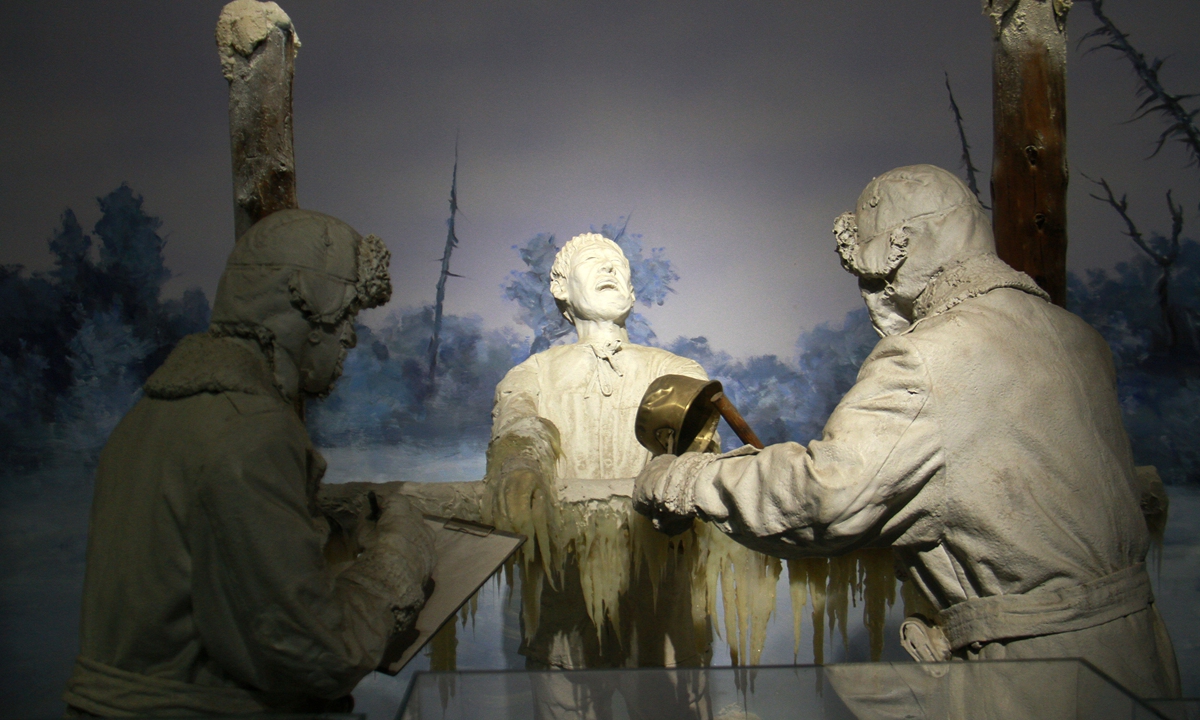
A group of statues in Harbin, Northeast China's Heilongjiang showing the brutal crime conducted by the Unit 731, an infamous Japanese germ warfare unit during its invasion in China Photo: VCG
After WWII, Japanese authorities introduced the discriminatory Eugenics Protection Law in 1948 to "avoid the birth defective offspring," which allowed doctors to sterilize people with mental or physical handicaps, hereditary diseases and leprosy.Many victims of the eugenics law have shared their sad stories to media over the past years. "I was sterilized just like an animal is castrated; it was so humiliating," Japanese citizen Yasuji Hirasawa, a leprosy patient who was forced to be sterilized weeks before his wedding decades ago, recalled to the Associated Press in 1997.
Many victims of the eugenics law have shared their sad stories to media over the past years. "I was sterilized just like an animal is castrated; it was so humiliating," Japanese citizen Yasuji Hirasawa, a leprosy patient who was forced to be sterilized weeks before his wedding decades ago, recalled to the Associated Press in 1997.
There were roughly 21,000 people subjected to sterilization surgery under the eugenics law, of which "at least 16,500 of them against their will," The Japan Times reported in July 2020. When similar laws or policies in some Western countries were repealed in the 1970s, Japan's eugenics law was abolished under growing criticism only as late as in 1996.
These "stains" are in fact legacies of Japan's colonialism in history. Instead of acknowledging its historical human rights debt, Japan is rather attempting to cover up its own crimes and disasters, Lü said.
Lü noted that in recent years, Japanese leaders have been promoting the "soft values diplomacy," following and pandering to the so-called human rights and freedom rhetoric of the West. Especially amid the rise of right-wing forces in Japan, such strategy has become more and more obvious.
Earlier, the Japanese parliament even asked the government to take steps to relieve the situation when it passed the bill on the so-called human rights issues in China in February 2022.
The fact that Japan continues to attack China with the excuses of human rights despite the fact that many regarding aspects in Japan remain unresolved reflects the lack of a truly independent foreign policy of the Japanese government, which follows only the diplomatic strategy of the US, Zhou said.
"We hope Japan can truly recognize and reflect on its historical human rights crimes, apologize and compensate for the contemporary and historical victims, instead of using the accusation of China's human rights as an excuse to cover up their own crisis," Lü said.
